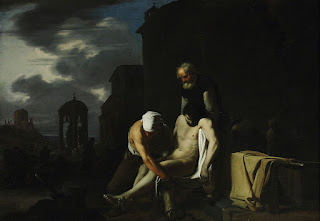 The High Priest and nazir have this in common: they are not allowed to become ritually impure by touching a dead body. And yet, if any of them finds an unattended corpse so that the obligation to bury the body devolves on him, he should attend to it, even though he will become ritually impure.
The High Priest and nazir have this in common: they are not allowed to become ritually impure by touching a dead body. And yet, if any of them finds an unattended corpse so that the obligation to bury the body devolves on him, he should attend to it, even though he will become ritually impure.
What if a High Priest and a nazir find this corpse together – who is obligated to bury this dead and thus preserve the other one from becoming impure? This should be the High Priest because to purify himself, he only needs to wait for seven days and get himself sprinkled with the ashes of the Red Heifer. By contrast, a nazir would need to bring special sacrifices before he can restart being a nazir. This is the opinion of Rabbi Eliezer. The Sages say just the opposite. Nazir should bury because his limitations are temporary, whereas the High Priest should always be pure.
In this argument, the positions are clearly stated. But now the Talmud compares other gradations, such as the Priest Anointed for War and a Deputy High Priest; who is more important? This is resolved as follows: to preserve the life of the Priest Anointed for War, he is more critical because he serves the needs of many people. But concerning purity, the Deputy is more important concerning purity because he can be called to serve in the Temple any time the chief High Priest becomes impure.
Art: Burying the Dead by Michael Sweerts

No comments:
Post a Comment